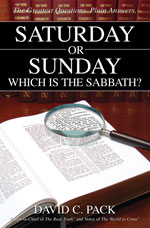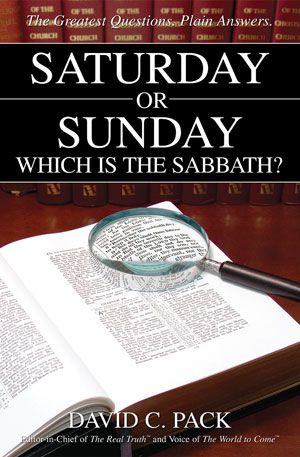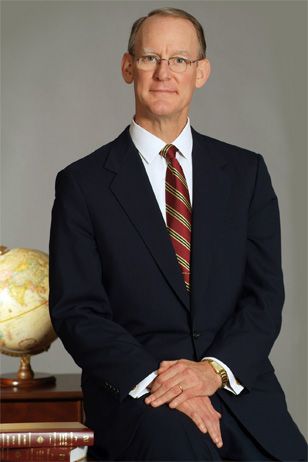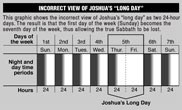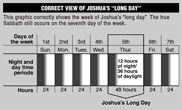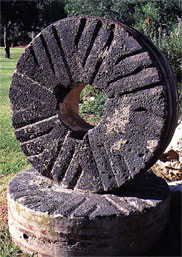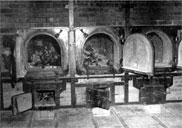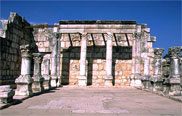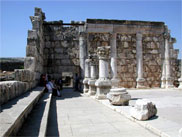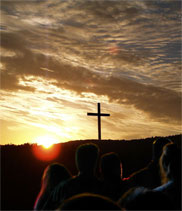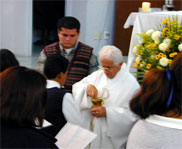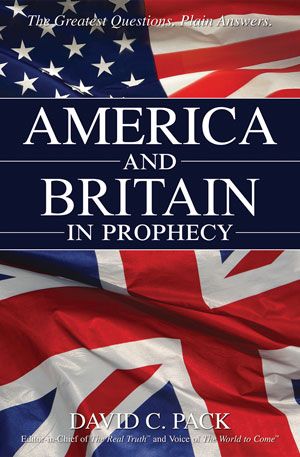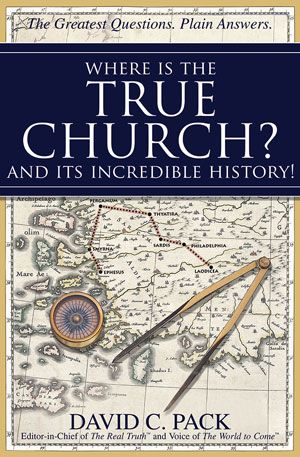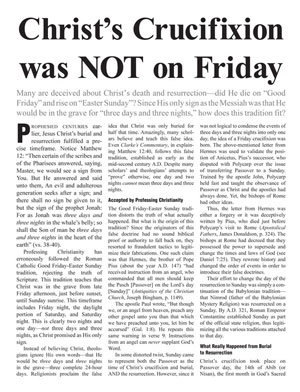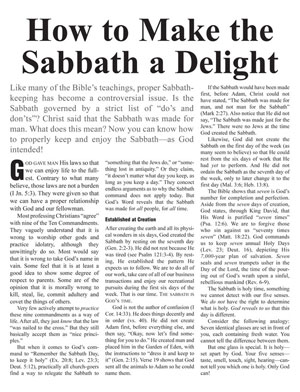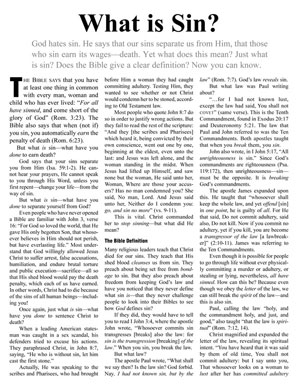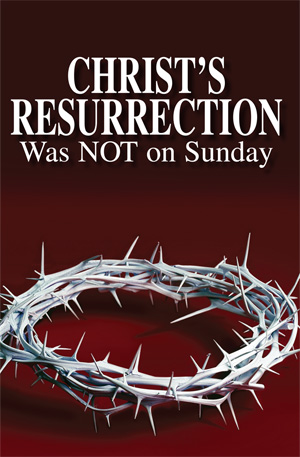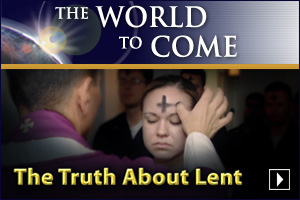I grew up in a large, respected Protestant church. I can recall sitting on a stool wearing a bow tie in Sunday school at age three, surrounded by other children. As I grew older, Sunday school became Sunday church services, with everyone taking for granted that we were there on the right day. No one remotely suggested otherwise. We all appeared weekly in our “Sunday best.” This continued for years, with no one questioning anything that was done.
Things changed in 1966 because, at age seventeen, I was challenged to look into the Bible to see what it actually says on the matter of Sunday-keeping. I was absolutely shocked by what I found! You will be also.
While the world is geared contrary to Sabbath observance on the seventh day of the week, I realized there was no excuse for breaking the Sabbath. I found the Bible was plain, leaving no room for doubt. The scriptures about the Sabbath and Sunday were most clear. I saw that common objections to Sabbath observance were easily disproven, if one had an open mind.
Unless God did not exist, and the Bible was the word of men—merely ancient Hebrew and Greek literature—I had no choice but to observe the Sabbath. Since proving that God exists and the Bible is His Word, and since seeing proof of the Sabbath command from the Bible, I have never attended church on Sunday again or observed that day. I found that the Fourth Commandment is a LAW. When kept, it brings spiritual blessings, “keeping” those who obey it. When broken, it brings spiritual curses, “breaking” those who disobey it.
Universal Acceptance
There are over two billion professing Christians on Earth. They attend over 2,000 different church denominations and organizations in the United States alone. This number continually increases, and the result has been no end of confusion over differing beliefs and disagreement between them. However, almost all professing Christians are in agreement about Sunday observance, thinking it to be the biblically authorized “Lord’s Day” of the New Testament.
Are they correct? Does the New Testament establish Sunday in place of the Old Testament seventh-day Sabbath? Did Jesus Christ do away with the Sabbath, making Himself “Lord of Sunday”? Vast numbers are told—and believe—that He did. But, if Christ established Sunday to replace the seventh-day Sabbath, why did He tell His disciples, “Therefore the Son of man is Lord also of the sabbath” (Mark 2:28)? This question alone towers over the debate.
Have you ever noticed this verse? Probably not. Yet there it is in the New Testament. Most ministers are fond of preaching from the New Testament, almost to the complete exclusion of the Old Testament. But have you ever heard a preacher—or professor, or theologian—mention this passage? Almost certainly not—and this is just one of many plain scriptures about the Sabbath.
Most people never ask why they believe what they believe or why they do what they do. In a world filled with popular customs and traditions, few try to determine the real origin of things. Most generally accept common religious practices without question, choosing to do what everyone else does because it is easy, natural and comfortable—because there is a certain “safety in numbers.” The power of peer pressure alone makes most avoid hard questions, so that they can practice what is acceptable—and fashionable.
Most follow along as they have been taught, assuming what they believe and do is right. They take their beliefs for granted, almost never taking time to PROVE them.
Nowhere is this more true than Sunday observance. Over two billion people keep Sunday without knowing why—or where this practice originated. Most suppose it is found in the Bible because they see so many professing Christians observing it. Many think Jesus was resurrected on Sunday after a Friday crucifixion—and that this made Sunday the Lord’s Day. Surely billions cannot be wrong. Or can they?
Incriminating Honesty
A study of the Bible, on almost all teachings generally accepted by the churches of this world—professing Christianity—reveals that they have almost no biblical basis whatsoever. This statement is shocking, yet it is true!
But here is an irony: When confronted with the truth of what the Bible really says on a matter, most churchgoers will attempt to deny the facts, however indisputable. They will twist, distort and blur the issues in order to hold to cherished beliefs, preferring what is familiar to what is right—and true!
The Sabbath question is somewhat different. Though, in the end, most people are unwilling to observe it, many ministers, theologians and religionists openly acknowledge what the Bible says about the Sabbath. When pressed, they admit God’s Word authorizes observing the seventh day.
In fact, you will be stunned at their frankness and honesty!
Roman Catholic Admission
Catholic publications, popes, cardinals, bishops, theologians, historians, professors, and the Vatican itself, have candidly admitted there is no biblical basis—whatsoever!—for Sunday observance. This book includes many quotations from them. You will be astonished at the extraordinary candor with which Catholic leaders address this subject.
It is critically important to take the time to read what those who keep Sunday say about their authority—or lack of authority—for doing this. Using their own words, we must first establish why 1.2 billion Roman Catholics believe they are no longer obligated to observe the seventh-day Sabbath. They tell the whole world openly!
The Bible plainly states that Jesus Christ is the Head of the Church (Eph. 1:22-23; Col. 1:18). Rome, supposing that Christ, in effect, delegated away His authority over the Church to the apostle Peter—who they proclaim was the first pope—speaks plainly of how it has used this “authority.” Just as God’s statements about the Sabbath were shocking to me, the following statements should be shocking to you! (Many are included for emphasis.)
“For example, nowhere in the Bible do we find that Christ or the Apostles ordered that the Sabbath be changed from Saturday to Sunday. We have the commandment of God given to Moses to keep holy the Sabbath day, that is the 7th day of the week, Saturday. Today most Christians keep Sunday because it has been revealed to us by the [Roman Catholic] church outside the Bible.”
- “To Tell You the Truth,” The Catholic Virginian
“From this same Catholic Church you have accepted your Sunday, and that Sunday, as the Lord’s day, she has handed down as a tradition; and the entire Protestant world has accepted it as tradition, for you have not an iota of Scripture to establish it. Therefore that which you [Protestants] have accepted as your rule of faith, inadequate as it of course is, as well as your Sunday, you have accepted on the authority of the Roman Catholic Church.”
- David B. Ray, The Papal Controversy Involving the Claim of the Roman Catholic Church to the Church of God
“I have repeatedly offered $1,000 to any one who can prove to me by the Bible alone that I am bound to keep Sunday holy. There is no such law in the Bible. It is a law of the holy Catholic church alone. The Bible says, ‘Remember that thou keep holy the Sabbath day.’ THE CATHOLIC CHURCH says, ‘No! By my Divine power I abolish the Sabbath day, and command you to keep holy the first day of the week.’ And lo! the entire civilized world bows down in reverent obedience to the command of the holy Catholic Church.”
- Bishop Thomas Enright, personal letter printed in Experiences of a Pioneer Minister of Minnesota
“There’s but one [church] on the face of the earth—the Catholic Church—that has the power to make laws binding on the conscience, binding before God, binding under pain of hell fire. Take for instance the day we celebrate—Sunday. What right have the Protestant churches to observe that day? None whatsoever. You say it is to obey the commandment, ‘Remember the Sabbath day to keep it holy.’ But Sunday is not the Sabbath according to the Bible and the record of time. Every one knows that Sunday is the first day of the week, while Saturday is the seventh day and the Sabbath, the day consecrated as a day of rest. It is so recognized in all civilized nations. I have repeatedly offered $1000 to any one who will furnish any proof from the Bible that Sunday is the day we are bound to keep, and no one has called for the money…It was the holy Catholic Church that changed the day of rest from Saturday to Sunday, the first day of the week.”
- Bishop Thomas Enright, “Father Enright on the Sunday,” printed in The American Sentinel
“Is Saturday the seventh day according to the Bible and the Ten Commandments? I answer yes. Is Sunday the first day of the week and did the Church change the seventh day—Saturday—for Sunday, the first day? I answer yes. Did Christ change the day? I answer no!”
- James Cardinal Gibbons, Archbishop of Baltimore (1877-1921), signed letter
“Reason and sense demand the acceptance of one or the other of these alternatives: either…the keeping holy of Saturday or Catholicity and the keeping holy of Sunday. Compromise is impossible.”
- James Cardinal Gibbons, Catholic Mirror
“A rule of Faith, or a competent guide to heaven, must be able to instruct in all the truths necessary for salvation. Now the Scriptures alone do not contain all the truths which a Christian is bound to believe, nor do they explicitly enjoin all the duties which he is obliged to practise. Not to mention other examples, is not every Christian obliged to sanctify Sunday, and to abstain on that day from unnecessary servile work? Is not the observance of this law among the most prominent of our sacred duties? But you may read the Bible from Genesis to Revelation, and you will not find a single line authorizing the sanctification of Sunday. The Scriptures enforce the religious observance of Saturday, a day which we never sanctify.
“The Catholic Church correctly teaches that our Lord and His Apostles inculcated certain important duties of religion which are not recorded by the inspired writers. For instance, most Christians pray to the Holy Ghost, a practice which is nowhere found in the Bible.
“We must, therefore, conclude that the Scriptures alone cannot be a sufficient guide and rule of faith, because they cannot, at any time, be within the reach of every inquirer; because they are not of themselves clear and intelligible even in matters of the highest importance, and because they do not contain all the truths necessary for salvation.”
- James Cardinal Gibbons, Faith of our Fathers
[Author’s Note: The apostle Paul, under inspiration by God, also disagrees. Speaking of just the Old Testament books, which were available to him, he wrote this: “And that from a child you have known the holy scriptures, which are able to make you wise unto salvation through faith which is in Christ Jesus. All scripture is given by inspiration of God…” (II Tim. 3:15-16).]
“The Bible everywhere enforces the sanctification of Saturday the seventh day of the week…You Protestants have to admit the authority of the Roman Catholic Church that is branded on you when you observe Sunday because you have no other authority for Sunday but that of the Roman Catholic Church.”
- James Cardinal Gibbons
“The Catholic Church for over one thousand years before the existence of a Protestant, by virtue of her Divine mission, changed the day from Saturday to Sunday.”
- James Cardinal Gibbons, “The Christian Sabbath,” Catholic Mirror
“Question: What Bible authority is there for changing the Sabbath from the seventh to the first, day of the week? Who gave the pope the authority to change a command of God?
“Answer: If the Bible is the only guide for the Christian, then the Seventh-day Adventist is right in observing the Saturday with the Jew. But Catholics learn what to believe and do from the divine, infallible authority established by Jesus Christ, the Catholic Church…Is it not strange that those who make the Bible their only teacher should inconsistently follow in this matter the tradition of the Church?”
- Rev. Bertrand Conway, The Question-box Answers
“Q. Have you any other way of proving that the Church has power to institute festivals of precept?
“A. Had she not such power, she could not have done that in which all modern religionists agree with her;—she could not have substituted the observance of Sunday the first day of the week, for the observance of Saturday the seventh day, a change for which there is no Scriptural authority.”
- Rev. Stephen Keenan, A Doctrinal Catechism
“‘Our Lord rose from the dead on the first day of the week,’ said Father Hourigan of the Jesuit Seminary. ‘That is why the Church changed the day of obligation from the seventh day to the first day of the week. The Anglican and other Protestant denominations retained that tradition when the Reformation came along.’”
- Toronto Daily Star, Oct. 26, 1949
“Some theologians have held that God likewise directly determined the Sunday as the day of worship in the New Law, that He Himself has explicitly substituted the Sunday for the Sabbath. But this theory is now entirely abandoned. It is now commonly held that God simply gave His Church the power to set aside whatever day or days she would deem suitable as Holy Days. The Church chose Sunday, the first day of the week, and in the course of time added other days as holy days.”
- Rev. John Laux, A Course in Religion for Catholic High Schools and Academies
“Nowhere in the Bible is it stated that worship should be changed from Saturday to Sunday…Now the Church…instituted, by God’s authority, Sunday as the day of worship. This same Church, by the same divine authority, taught the doctrine of Purgatory long before the Bible was made. We have, therefore, the same authority for Purgatory as we have for Sunday.”
- Martin J. Scott, Things Catholics Are Asked About
“Regarding the change from the observance of the Jewish Sabbath to the Christian Sunday, I wish to draw your attention to the facts:
“1) That Protestants, who accept the Bible as the only rule of faith and religion, should by all means go back to the observance of the Sabbath. The fact that they do not, but on the contrary observe the Sunday, stultifies them in the eyes of every thinking man.
“2) We Catholics do not accept the Bible as the only rule of faith. Besides the Bible we have the living Church, the authority of the Church, as a rule to guide us. We say, this Church, instituted by Christ to teach and guide man through life, has the right to change the ceremonial laws of the Old Testament and hence, we accept her change of the Sabbath to Sunday. We frankly say, yes, the Church made this change, made this law, as she made many other laws, for instance, the Friday abstinence, the unmarried priesthood, the laws concerning mixed marriages, the regulation of Catholic marriages and a thousand other laws…
“It is always somewhat laughable, to see the Protestant churches, in pulpit and legislation, demand the observance of Sunday, of which there is nothing in their Bible.”
- Peter R. Kraemer, Catholic Church Extension Magazine
“We move from the ‘Sabbath’ to the ‘first day after the Sabbath’, from the seventh day to the first day: the dies Domini becomes the dies Christi!…By contrast, the Sabbath’s position as the seventh day of the week suggests for the Lord’s Day a complimentary symbolism, much loved by the Fathers. Sunday is not only the first day, it is also ‘the eighth day’, set within the sevenfold succession of days…”
- Pope John Paul II, “Apostolic Letter, Dies Domini”
“Only gradually did Christians begin to observe Sunday as a day of rest…In the third century, as we learn from Tertullian, many Christians had begun to keep Sunday as a day of rest to some extent.
“The real need of Sunday as a day of rest as well as worship came much later.”
- Yes, I Condemned the Catholic Church, Supreme Council, Knights of Columbus
“Question: Which is the Sabbath day?
“Answer: Saturday is the Sabbath day.
“Question: Why do we observe Sunday instead of Saturday?
“Answer: We observe Sunday instead of Saturday because the Catholic Church, in the Council of Laodicea (AD [363]), transferred the solemnity from Saturday to Sunday.”
- Peter Geiermann, The Convert’s Catechism of Catholic Doctrine
[Author’s Note: At this same fourth century Council of Laodicea—in AD 363—the following edict was passed: “Christians must not judaize by resting on the Sabbath” (A Select Library of Nicene and Post-Nicene Fathers of the Christian Church). The penalty for disobedience was death!]
Protestants Follow Rome
About one billion Protestants also observe Sunday. Before examining what they say about why they observe the first day of the week, here are several quotes from the Catholics explaining their view of why the Protestants do what they do. Consider them carefully.
“Practically everything that Protestants regard as essential or important they have received from the Catholic Church. They accepted Sunday rather than Saturday as the day for public worship after the Catholic Church made that change.
“But the Protestant mind does not seem to realize that in accepting the Bible, in observing the Sunday, in keeping Christmas and Easter, they are accepting the authority of the spokesman for the church, the pope.”
- Our Sunday Visitor, Feb. 5, 1950
“It was the Catholic Church which, by the authority of Jesus Christ, has transferred this rest to the Sunday in remembrance of the resurrection of our Lord. Thus the observance of Sunday by the Protestants is an homage they pay, in spite of themselves, to the authority of the [Catholic] church.”
- Mgr. Louis G. Ségur, “Plain Talk About the Protestantism of To-day”
“Q: How prove you that the Church hath power to command feasts and holydays?
“A: By the very act of changing the Sabbath into Sunday, which Protestants allow of; and therefore they fondly contradict themselves, by keeping Sunday strictly, and breaking most other feasts commanded by the same Church.
“Q: How prove you that?
“A: Because by keeping Sunday, they acknowledge the Church’s power to ordain feasts, and to command them under sin: and by not keeping the rest [of the feasts] by her commanded, they again deny, in fact, the same power.”
- Rev. Henry Tuberville, D.D., An Abridgment of the Christian Doctrine
“Catholic: Is the Bible the rule or guide of Protestants for observing Sunday?
“Protestant: No, I believe the Seventh-day Adventists are the only ones who know the Bible in the matter of Sabbath observance.”
- The Bible an Authority Only in Catholic Hands
“When St. Paul repudiated the works of the law, he was not thinking of the Ten Commandments, which are as unchangeable as God Himself is, which God could not change and still remain the infinitely holy God.”
- Our Sunday Visitor, Oct. 7, 1951
What Protestants Confess
Protestant officials from many denominations have also candidly admitted there is no biblical authority for Sunday observance. Here are their quotations, with most categorized into Protestant denominations.
Lutheran: The first true “protestant” was Martin Luther. No record of Protestant teaching is complete without the words of this earliest reformer.
Notice this quote pertaining to Luther’s commentary on Exodus 16:4, 22-30, regarding the Sabbath: “Hence you can see that the Sabbath was before the Law of Moses came, and has existed from the beginning of the world. Especially have the devout, who have preserved the true faith, met together and called upon God on this day” (Luther’s Works).
[Author’s Note: Martin Luther also personally kept the Sabbath. The next source reveals why he did not urge others to do the same.]
“Luther himself, while it is said believed in and practiced the observance of the seventh-day Sabbath, did not prescribe it in his articles of faith for his followers, in the copies that we now have access to. However, it has been said that in his original thesis, Luther advocated the observance of the seventh-day Sabbath, but that his colleagues objected on the grounds that it was an unpopular doctrine, which would have a tendency to repulse supporters of the Reformation who were not as pious as they should have been, but were of great assistance against the usurpations of the papacy.”
- Andrew Dugger and Clarence Dodd, A History of the True Religion
“They [Roman Catholics] appeal as well to the transference of the sabbath to Sunday—contrary to the Ten Commandments, as they view it. No other example is so strongly emphasized and quoted as the transference of the sabbath. Thereby they want to maintain that the power of the church is great, because it has dispensed with and altered part of the Ten Commandments.”
- Philip Melanchthon, The Augsburg Confession
“We have seen how gradually the impression of the Jewish sabbath faded from the mind of the Christian Church, and how completely the newer thought underlying the observance of the first day took possession of the church. We have seen that the Christians of the first three centuries never confused one with the other, but for a time celebrated both.”
- The Sunday Problem, a study book of the United Lutheran Church
“The festival of Sunday, like all other festivals, was always only a human ordinance, and it was far from the intentions of the apostles to establish a Divine command in this respect, far from them, and from the early apostolic Church, to transfer the laws of the Sabbath to Sunday.”
- Dr. Augustus Neander, The History of the Christian Religion and Church
“But they err in teaching that Sunday has taken the place of the Old Testament Sabbath and therefore must be kept as the seventh day had to be kept by the children of Israel…These churches err in their teaching, for Scripture has in no way ordained the first day of the week in place of the Sabbath. There is simply no law in the New Testament to that effect.”
- John Theodore Mueller, Sabbath or Sunday?
Anglican/Episcopal: “And where are we told in the Scriptures that we are to keep the first day at all? We are commanded to keep the seventh; but we are nowhere commanded to keep the first day…The reason why we keep the first day of the week holy instead of the seventh is for the same reason that we observe many other things,—not because the Bible, but because the [Roman] church has enjoined it.”
- Isaac Williams, Plain Sermons on the Catechism
“There is no word, no hint, in the New Testament about abstaining from work on Sunday…into the rest of Sunday no divine law enters…The observance of Ash Wednesday or Lent stands exactly on the same footing as the observance of Sunday.”
- Canon Robert Eyton, The Ten Commandments
“We have made the change from the seventh day to the first day, from Saturday to Sunday, on the authority of the one holy, catholic, apostolic Church of Christ.”
- Bishop George F. Seymour, Why We Keep Sunday
Baptist: “There was and is a commandment to keep holy the Sabbath day, but that Sabbath day was not Sunday. It will be said, however, and with some show of triumph, that the Sabbath was transferred from the seventh to the first day of the week…Where can the record of such a transaction be found? Not in the New Testament absolutely not.
“To me it seems unaccountable that Jesus, during three years’ intercourse with His disciples, often conversing with them upon the Sabbath question…never alluded to any transference of the day; also, that during forty days of His resurrection life, no such thing was intimated.
“Of course, I quite well know that Sunday did come into use in early Christian history…But what a pity it comes branded with the mark of paganism, and christened with the name of the sun god, adopted and sanctioned by the papal apostasy, and bequeathed as a sacred legacy to Protestantism!”
- Dr. Edward T. Hiscox, before a New York ministers’ conference, Nov. 13, 1893, New York Examiner, Nov. 16, 1893
“There was never any formal or authoritative change from the Jewish seventh-day Sabbath to the Christian first-day observance.”
- William Owen Carver, Sabbath Observance
Congregationalist: “It is quite clear that however rigidly or devoutly we may spend Sunday, we are not keeping the Sabbath…The Sabbath was founded on a specific Divine command. We can plead no such command for the obligation to observe Sunday…There is not a single sentence in the New Testament to suggest that we incur any penalty by violating the supposed sanctity of Sunday.”
- Dr. Robert W. Dale, The Ten Commandments
“The Christian Sabbath [Sunday] is not in the Scriptures, and was not by the primitive Church called the Sabbath.”
- Timothy Dwight, Theology: Explained and Defended in a Series of Sermons
Disciples of Christ: “‘But,’ say some, ‘it was changed from the seventh to the first day.’ Where? when? and by whom? No man can tell. No, it never was changed, nor could it be, unless creation was to be gone through again: for the reason assigned must be changed before the observance, or respect to the reason, can be changed!! It is all old wives’ fables to talk of the change of the sabbath from the seventh to the first day. If it be changed, it was that august personage changed it who changes times and laws ex officio—I think his name is DOCTOR ANTICHRIST.”
- Alexander Campbell, The Christian Baptist
“The first day of the week is commonly called the Sabbath. This is a mistake. The Sabbath of the Bible was the day just preceding the first day of the week. The first day of the week is never called the Sabbath anywhere in the entire Scriptures. It is also an error to talk about the change of the Sabbath from Saturday to Sunday. There is not in any place in the Bible any intimation of such a change.”
- First Day Observance
Methodist: “But, the moral law contained in the Ten Commandments, and enforced by the prophets, he [Christ] did not take away. It was not the design of His coming to revoke any part of this. This is a law which never can be broken…Every part of this law must remain in force upon all mankind, and in all ages; as not depending either on time or place, or any other circumstances liable to change, but on the nature of God, and the nature of man, and their unchangeable relation to each other.”
- Rev. John Wesley, The Works of the Rev. John Wesley, A.M. Sometime Fellow of Lincoln College
“Take the matter of Sunday. There are indications in the New Testament as to how the church came to keep the first day of the week as its day of worship, but there is no passage telling Christians to keep that day, or to transfer the Jewish Sabbath to that day.”
- Harris Franklin Rall, Christian Advocate
Presbyterian: “The Sabbath is a part of the decalogue—the Ten Commandments. This alone forever settles the question as to the perpetuity of the institution…Until, therefore, it can be shown that the whole moral law has been repealed, the Sabbath will stand…The teaching of Christ confirms the perpetuity of the Sabbath.”
- Thaddeus C. Blake, D.D., Theology Condensed
Dwight L. Moody: “The Sabbath was binding in Eden, and it has been in force ever since. This fourth commandment begins with the word ‘remember,’ showing that the Sabbath already existed when God wrote the law on the tables of stone at Sinai. How can men claim that this one commandment has been done away with when they will admit that the other nine are still binding?”
- Dwight L. Moody, Weighed and Wanting
Worship Christ in Vain?
It is ironic that at least three well-known Protestant figures here freely admit that the Sabbath has never been changed and is still binding on Christians—but do not keep it themselves!
Here is what Christ said about the popular commandments and traditions of the world—and its churches: “IN VAIN do they worship Me, teaching for doctrines the commandments of men…Full well [these men know exactly what they are doing] you reject the commandment of God, that you may keep your own tradition” (Mark 7:7, 9).
Let’s plainly frame the question: Do we observe the day that GOD commands—or do we observe the traditional day that the Roman Catholics command, and Protestants endorse? This church and its daughter churches are wrong on virtually every doctrine in the Bible—salvation, heaven, hell, method of baptism, the Law, the definition of sin, the trinity, which annual days should be observed by Christians, prophecy, and many more. Over and over, it has substituted its commands and traditions in place of what God plainly says in His Word. Should you follow its authority, believing it to be greater than the authority of God?
It is possible to worship God in vain. Therefore, you must find out, once and for all, whether Sunday-keeping and worship is what God expects of you—or even permits.
Technically, this book could end here. Though we will see that a few, very weak arguments are put forth in favor of Sunday, in a sense, there is no further room for argument. If those who keep Sunday will so freely acknowledge that they have no authority from God—in His Word, the Holy Bible—for doing so, and the plain biblical command is seen, observance of the Sabbath has been clearly established!
But God has much to say about the crucial importance of observing His Sabbath every seven days. This includes understanding why Christians must do this. What you will read in the remainder of this book is not supposition. It is scriptural fact—proof from God—that the Sabbath was commanded 6,000 years ago.
You will see that neither God nor His command has ever changed!

